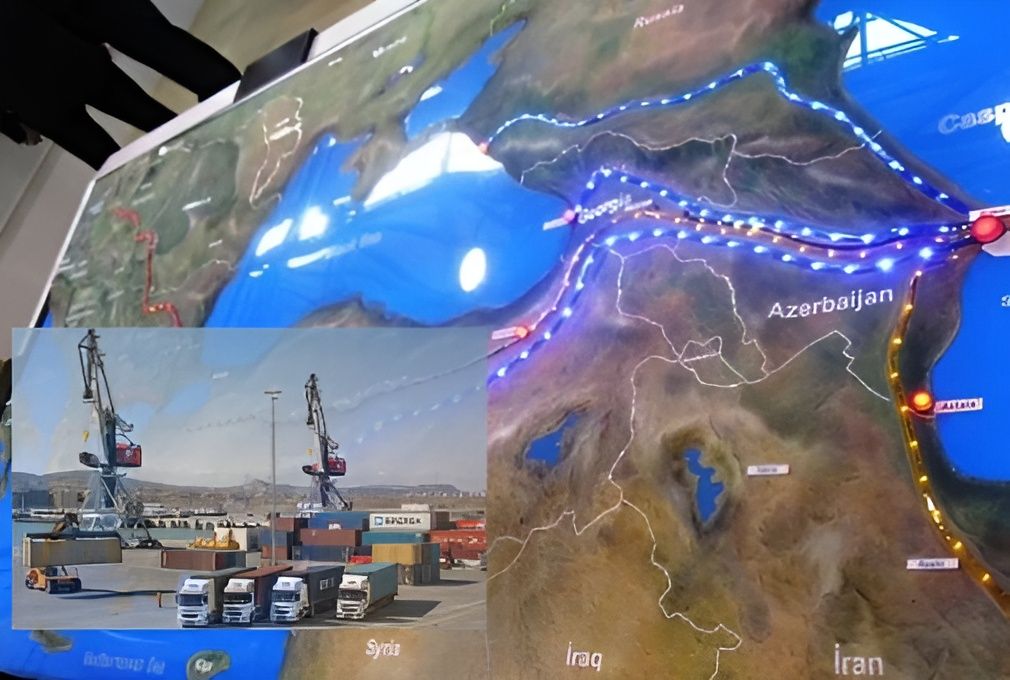Azerbaijan redefines Eurasian Logistics by boosting trade over Middle Corridor

As the Middle Corridor, also known as the Trans-Caspian International Transport Route, becomes increasingly essential for Eurasian trade, Azerbaijan’s role as a key transit country is growing. This route, connecting China to Europe through Kazakhstan, the Caspian Sea, Azerbaijan, Georgia, and Türkiye, offers an alternative path that bypasses Russia, addressing some of the geopolitical tensions that have recently impacted global trade routes. In this article, we explore the importance of Azerbaijan’s contributions to this evolving corridor and the broader Eurasian logistics network.
What makes the Middle Corridor a key route for Eurasian Trade?
The Middle Corridor is gaining strategic significance as an alternative to the traditional Northern trade route through Russia, providing a reliable channel for moving goods between East Asia and Europe. The route, which traverses China, Kazakhstan, the Caspian Sea, Azerbaijan, Georgia, and Türkiye, allows for faster and more politically neutral trade, particularly in the wake of Russia’s conflict with Ukraine. Recent discussions in Shanghai between Kazakhstan’s Prime Minister Oljas Bektenov and China’s State Council Prime Minister Li Qian underscored the importance of this route. Kazakhstan, keen to enhance its role within the Belt and Road framework, reported a substantial increase in freight movement through the corridor, with the first nine months of this year surpassing last year’s total by 23 percent—totaling 3.4 million tons. By 2030, Kazakhstan hopes to see this volume rise to 10 million tons annually, marking a major shift in Eurasian trade dynamics.
Azerbaijan’s geographic position and investment in modern infrastructure, such as the Baku International Sea Trade Port, underscore its role in facilitating efficient transit along the Middle Corridor. Positioned at the crossroads of Asia and Europe, Azerbaijan is strategically set to enhance connections across Central Asia, the Caspian Sea, and Europe. Additionally, according to the World Bank, trade turnover between Azerbaijan, Georgia, and Kazakhstan with EU countries could increase by as much as 28% by 2030, adding further significance to the project. As a result, it has become a vital player in developing seamless logistics for the movement of goods across these regions, bolstered by its investments in advanced port facilities and integrated transportation infrastructure.
Redefining bridge between East-West logistics
The Middle Corridor is part of China’s Belt and Road Initiative (BRI), a massive infrastructure and development project aimed at boosting trade across Asia, Africa, and Europe.
Key partners of the Trans-Caspian International Transport Route (TITR), Baku and Astana, have been collaborating for several years to modernize the port and railway infrastructure along the route. A major initiative, the Roadmap for the synchronous elimination of "bottlenecks" and the development of the Middle Corridor for 2022-2027, is currently in progress. This plan includes upgrading the sea hub at the port of Aktau and the container terminal in Alat, aiming to increase container capacity to over 300,000, with a long-term goal of reaching 600,000 units. Furthermore, the capacity of the Baku-Tbilisi-Kars (BTK) railway has expanded from 1 million to 5 million tonnes of cargo. The Alat International Trade Port is also undergoing upgrades to handle 25 million tonnes, an increase from the previous capacity of 15 million tonnes. Last year, a new fertilizer terminal was inaugurated at this port. These efforts have already resulted in a 65% increase in cargo volumes along the Middle Corridor in 2023, nearly reaching 3 million tonnes, and projections suggest this figure could exceed 4.2 million tonnes by the end of 2024.
Are green energy corridors part of the Middle Corridor vision?
Undoubtedly, Azerbaijan’s role in the Middle Corridor doesn’t limit itself to railway transportation. A critical component of Azerbaijan's modernization efforts involves integrating Green Energy Corridors into its transit infrastructure. By facilitating renewable energy exchange—such as wind, solar, and hydroelectric power—these corridors align with Europe’s sustainability goals and initiatives like the European Green Deal and REPowerEU. For instance, according to the "Agreement on Strategic Partnership in the Field of Development and Transmission of Green Energy," signed in Bucharest on December 17, 2022, Azerbaijan, Georgia, Romania, and Hungary have established a cooperative framework. This project, known as the "Caspian-Black Sea-Europe Green Energy Corridor" or "Black Sea Cable," aims to transport green energy generated from Azerbaijani wind power plants to Romania and, eventually, Europe. For Azerbaijan, green energy corridors represent an opportunity to contribute to Europe’s energy diversification while reducing reliance on fossil fuels, adding a sustainable dimension to its role in the Middle Corridor.
What does the future hold for the Middle Corridor?
With COP29 soon to be hosted in Baku, Azerbaijan is gaining visibility as a country committed to sustainability and regional cooperation. The Middle Corridor’s future looks promising, with Azerbaijan positioned as a pivotal transit hub in Eurasian trade. Its continued investment in infrastructure and green energy initiatives further solidifies this role, setting the stage for Azerbaijan to contribute meaningfully to both economic growth and environmental sustainability in the region.
Here we are to serve you with news right now. It does not cost much, but worth your attention.
Choose to support open, independent, quality journalism and subscribe on a monthly basis.
By subscribing to our online newspaper, you can have full digital access to all news, analysis, and much more.
You can also follow AzerNEWS on Twitter @AzerNewsAz or Facebook @AzerNewsNewspaper
Thank you!

